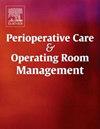COVID-19大流行期间择期手术患者对COVID-19恐惧的预测因素:一项观察性研究
IF 1
Q2 Nursing
Perioperative Care and Operating Room Management
Pub Date : 2025-06-25
DOI:10.1016/j.pcorm.2025.100516
引用次数: 0
摘要
COVID-19大流行扰乱了常规医疗服务,包括选择性手术,并加剧了患者的恐惧和焦虑。本研究使用印度COVID-19恐惧量表(ISF-C19)和数字焦虑评分(NAS)评估了印度中部接受选择性手术的患者对COVID-19相关恐惧的预测因素。方法于2021年10月至2022年5月在一家多专科医院对687例患者进行观察性研究。采用半结构化问卷、ISF-C19和NAS收集数据。将患者分为高(≥27)和低(<27) ISF-C19评分组。采用Logistic回归来确定高恐惧得分的预测因子。结果ISF-C19评分高与NAS升高(≥5)、合并症和既往无COVID-19感染显著相关。NAS是恐惧的最强预测因子(p = 0.001),而合并症也有显著影响(p = 0.007)。该模型的敏感性为67.40%,特异性为69.21%。结论术前焦虑(NAS)和合并症是手术患者新冠肺炎相关恐惧的关键预测因素。本文章由计算机程序翻译,如有差异,请以英文原文为准。
Predictors of fear of COVID-19 among patients undergoing elective surgery during the COVID-19 pandemic: An observational study
Background
The COVID-19 pandemic disrupted routine healthcare services, including elective surgeries, and heightened patient fear and anxiety. This study evaluates predictors of COVID-19-related fear among patients undergoing elective surgeries in central India, using the Indian Scale for Fear of COVID-19 (ISF-C19) and the Numerical Anxiety Score (NAS).
Methodology
An observational study of 687 patients was conducted at a multispeciality hospital between October 2021 and May 2022. Data were collected using a semi-structured questionnaire, ISF-C19, and NAS. Patients were stratified into high (≥27) and low (<27) ISF-C19 score groups. Logistic regression was employed to identify predictors of high fear scores.
Results
High ISF-C19 scores correlated significantly with elevated NAS (≥5), comorbidities, and lack of prior COVID-19 infection. NAS emerged as the strongest predictor of fear (p = 0.001), while comorbidities also had a significant impact (p = 0.007). The model demonstrated a sensitivity of 67.40 % and a specificity of 69.21 %.
Conclusion
This study identifies preoperative anxiety (NAS) and comorbidities as key predictors of COVID-19-related fear among surgical patients.
求助全文
通过发布文献求助,成功后即可免费获取论文全文。
去求助
来源期刊

Perioperative Care and Operating Room Management
Nursing-Medical and Surgical Nursing
CiteScore
1.30
自引率
0.00%
发文量
52
审稿时长
56 days
期刊介绍:
The objective of this new online journal is to serve as a multidisciplinary, peer-reviewed source of information related to the administrative, economic, operational, safety, and quality aspects of the ambulatory and in-patient operating room and interventional procedural processes. The journal will provide high-quality information and research findings on operational and system-based approaches to ensure safe, coordinated, and high-value periprocedural care. With the current focus on value in health care it is essential that there is a venue for researchers to publish articles on quality improvement process initiatives, process flow modeling, information management, efficient design, cost improvement, use of novel technologies, and management.
 求助内容:
求助内容: 应助结果提醒方式:
应助结果提醒方式:


